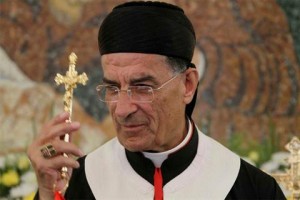 Maronite Patriarch Beshara al-Rai did not reportedly endorse the so called Orthodox Gathering proposed electoral law, or any other law according to a report by al-Mustaqbal newspaper published on Thursday.
Maronite Patriarch Beshara al-Rai did not reportedly endorse the so called Orthodox Gathering proposed electoral law, or any other law according to a report by al-Mustaqbal newspaper published on Thursday.
A source close to the patriarch Rai told the daily: “ He had not endorsed any electoral law over another… he only voiced his objection to the 1960 electoral law .”
“The patriarch had facilitated dialogue at Bkirki for the Christian factions to reach an agreement over a new law where he simply encouraged their agreement over any draft law that appeases Christians and the Lebanese people,” he added.
“The patriarch did not endorse any particular law but encouraged them to come up with a law that achieves fair representation,” he said.
Even the Greek Orthodox lawmakers are not endorsing the Orthodox Gathering proposed electoral law..
Lebanon Deputy Speaker Farid Makari , who is Greek Orthodox told An-Nahar newspaper in remarks published on Wednesday that he disagrees with Speaker Nabih Berri’s announcement in which he pledged prior approval of the decision on the electoral law by the Christian leaders and their representatives who meet in Bkirki last Sunday.
“With all due respect they are not all the Christians and Berri and everyone knows that the majority of the Christians are independent and do not have anything to do with the four parties that met in Bkirki. ” Makari said
Makari criticized the draft electoral law of the so called “orthodox” gathering stressing that he rejects it as the deputy speaker and as a member of the parliament because such a law will tear apart the social fabric among the Lebanese in addition to being unconstitutional and illegal.
The subcommittee tasked with deciding on an electoral law acceptable to the majority of the Lebanese resumed its meetings on Tuesday with representatives from the rival March 8 and 14 camps .
Lebanon’s Cabinet approved last August a new electoral draft law that called for proportional representation and divided the country into 13 districts as follows: Beirut 2, south Lebanon 2, Bekaa 3, north Lebanon 3 , Mount Lebanon 3.
The new electoral law was approved by the majority of ministers, including the FPM ministers . However the ministers that representProgressive Socialist Party leader MP Walid Jumblatt’s bloc voted against it.
Even though the FPM ministers voted for the cabinet ‘s electoral law draft, FPM MPs Alain Aoun and Neemtallah Abi Nasr submitted another draft electoral law to the parliament . This is the so called “Greek Orthodox gathering proposal” which calls on each sect in Lebanon to vote only for its candidate in the elections based on one electoral district for the whole country .
March 14 Christian MPs Georges Adwan, Boutros Harb and Sami Gemayel submitted a draft electoral law based on 50 districts and winner take all majority to the Parliament’s General Secretariat last October
Jumblatt and his PSP MPs still favor the current 1960 winner take all electoral law.
Lebanon is set to hold new parliamentary elections around June 2013, but the country’s political circles are divided over the electoral law issue .
A Christian four-party panel on the electoral law agreed on Sunday to endorse the electoral law proposed by the so-called Orthodox Gathering, under which each sect would elect its own lawmakers, and all Lebanon will be one electoral district
The panel took its decision during a meeting held in Bkirki. The four-party panel comprises representatives from the Free Patriotic Movement, the Lebanese Forces, the Phalange Party and the Marada Movement.
The Orthodox law was alos criticized by President Michel Suleiman, Premier Najib Miqati, National Struggle Front leader Walid Jumblat and several other Christian MPs and officials.

Leave a Reply
You must be logged in to post a comment.